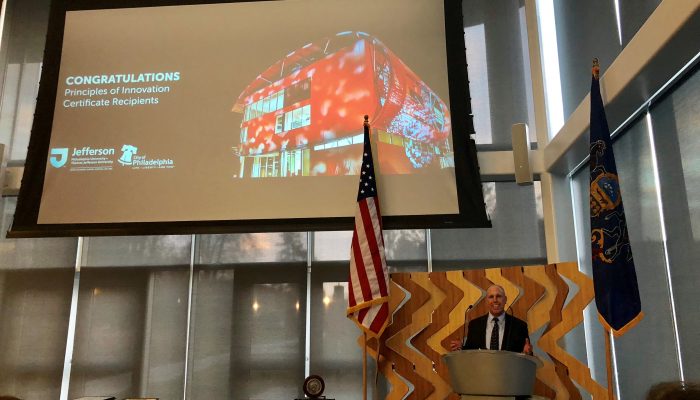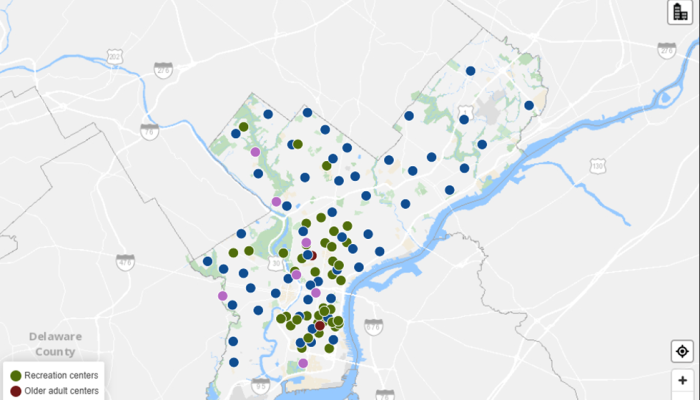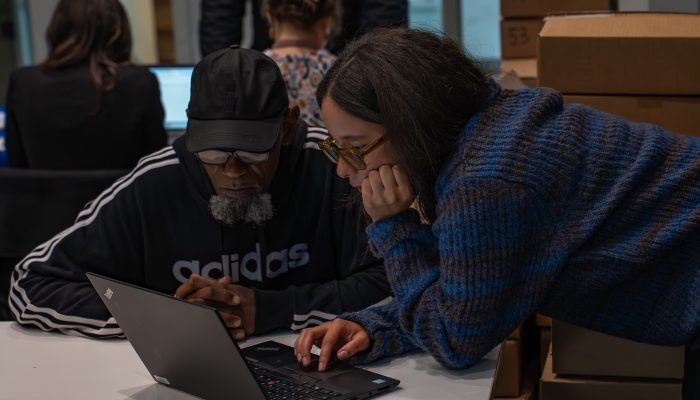Week 7: Challenge the Process
The fifth cohort of the Academy for Municipal Innovation kicked off in October 2017. This is a blog series written by participants about their experiences in the program. Today’s author is Kathleen Fox, Senior Business Analyst of Health Promotion, Department of Behavioral Health and Intellectual disAbility Services .
Here in Philadelphia there’s been a phrase thrown around a lot recently – “trust the process.” It’s a phrase that offers hope during a particularly low point for the Sixers. I am not a huge fan of the phrase because I think it connotes a laisse-faire attitude and doesn’t take responsibility for effecting change. I personally prefer to take matters into my own hands and challenge the process, and the Academy for Municipal Innovation (AMI) has equipped me with new tools and techniques to be able to do so.
What does it mean to challenge the process? Leaders should always actively seek opportunities to change the status quo. They should look for innovative ways to improve their own work, and to achieve the mission of their organization. In challenging the process, leaders constantly experiment and take risks. And because they know that risk-taking involves mistakes and failures, they accept the disappointments as learning opportunities. Challenging the process is one of five practices of exemplary leadership. AMI not only teaches the technical skills for innovative problem solving, but also instills in students the ability to lead authentically and inspire change.
The first step to challenge the process is to understand the fundamental flaws of existing infrastructure. In the Academy, I learned the importance of problem identification as a key step in innovation. You simply cannot create solutions or effect change without first defining, describing, and universally understanding the problem. In the course, we learned technical skills to identify problems as a team. It sounds obvious, but this is a critical skill that is so often ignored in the demanding nature of our work. A common “problem-solving process” in my work is to make an existing solution fit a problem and see if it works out. Taking time to identify a problem and work to have a uniform understanding of the problem makes innovating a solution even more effective and efficient.
It is an unfortunate stereotype of municipal government that assumes public servants are resistant to change. I met a group of awesome colleagues in my cohort at AMI who will each shatter this misinformed notion. Each AMI student is an intelligent, kind, and passionate individual who truly cares to serve Philadelphia. I met people from city agencies that I didn’t even know existed! Too often, we are so caught up in our own work that we lose sight of the bigger picture. All public servants work to better the city that we love. The connections built through AMI are invaluable and push us to challenge existing silos and infrastructures that may impede innovation. Because of AMI, we are now connected to a network of passionate civil servants who are willing to collaborate, problem solve, and work across systems to accomplish the same shared goal.
So, to AMI graduates and every public servant reading this blog – don’t sit idly by and trust the process. The city that we work tirelessly to improve deserves more than passive hope. I urge you to challenge the process – take charge, identify problems, innovate solutions, and inspire change in the work that you do. And, if you need any tools or guidance, there is a strong group of 100 AMI graduates well-versed in the principles and practices of innovation who are willing to offer their support for the betterment of Philadelphia.
7 weeks came & went…
The Academy for Municipal Innovation
Time well spent! 🎓Want to know more? Have a look at this article: https://t.co/GHSIKpiuGb#InnovationManagement #AMIGrads2017 pic.twitter.com/On5S7dbAYy
— PHLInnovation (@PHLInnovation) November 21, 2017
What is the Academy for Municipal Innovation?
AMI is a seven-week program that introduces participants to the principles and practice of innovation. Participants will learn to integrate tools and techniques of innovation drawn from design thinking, system thinking, business analytics, and ethnographic research to discover innovative solutions to complex real world problems. The program will be delivered in a studio setting, anchored in Jefferson University’s (formerly Philadelphia University) signature nexus learning pedagogy of active, collaborative, and real world learning. Each session will introduce practical techniques & tools that can be immediately applied at work to inspire innovation through collaboration.
Throughout the program, the City (Innovation Management) will offer opportunities to further develop the skills and tools that participants are learning in the classroom. Brown bag lunches, innovation consulting sessions and workshops will take place throughout the fall to encourage students to engage with the material in the context of their everyday portfolios, and to provide them with a space to meet past graduates and learn about how they’ve integrated innovative thinking into their roles.




